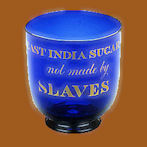
Quakers were at the forefront of the movement to boycott goods produced by slave labour. Going beyond boycotts, the “Free Produce” Movement, comparable with today’s Fairtrade movement, marketed goods wholly produced by free labour. Many Friends, especially in the early years of the movement, took these steps simply as a matter of conscience. For example Elias Hicks, in his Observations on the Slavery of the Africans and their Descendants and on the use of the products of their labour, wrote:
“May we not be led to conclude, that no man who is convinced of the cruelty and injustice of holding a fellow-creature in slavery, can traffic in, or make use of the produce of a slave’s labour, believing it to be such, without criminating himself”.